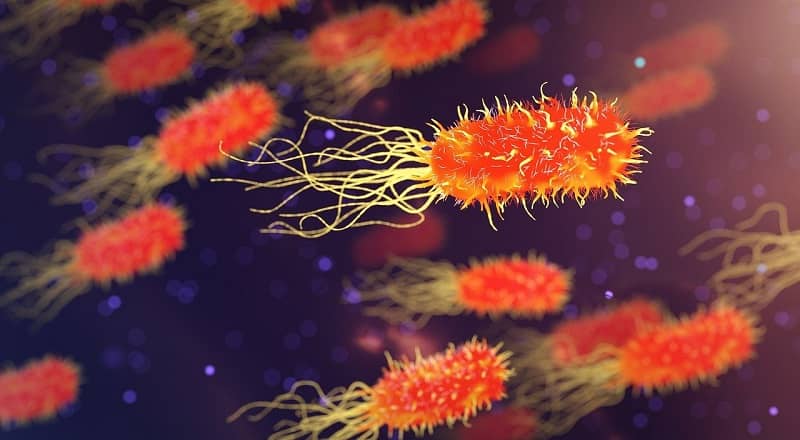
02 Feb Adjust Your Diet to Support a Healthy Gut Microbiome: Study
Besides association with specific diseases, Gut Microbiome has a significant impact on the immune system, heart, weight, and overall health.
A recent study shows a strong correlation between diet and gut microbiome.
Key Findings:
- Specific nutrients, foods, and food groups determine the gut microbiome, which influences metabolic activity.
- Bacterial species can indicate the risk of metabolic disorders like diabetes and heart disease.
- Intestinal bacterial species associated with healthy eating habits coincide with those determining cardiometabolic markers.
The human body comprises an extensive variety of bacteria, viruses, fungi, and other single-celled animals. Altogether, they are referred to as gut microbiome or human microbiota.
Diet appears to have a direct relation to the Gut Flora.
Short-term dietary changes can show a positive difference in Improving Gut Microbiome. However, only permanent changes in eating habits can show impactful results.
These observations concerned with gut microbiome and diet clearly depict breakthrough results, paving the way for future studies.
In this blog, we’ve managed to present a detailed outlook.
To get started, here’s a breakdown of the study!
The Study
Diet shapes your gut microbiome, which, in turn, impacts metabolic activity.
Come to think of it, this viral study links diet to disease prevention, though the relationship is unique for each person.
The researcher performed deep metagenomic sequencing of 1,203 gut microbiomes from 1,098 participants registered in the personalized responses to dietary composition trial (predict 1) study!
They went through an exhausting long-term diet detail. In fact, this involved hundreds of fasting and same-meal postprandial cardiometabolic blood marker measurements.
Eventually, a clear relationship between microbes and specific nutrients was observable. The observation extended to different food, food groups, and normal dietary signs.
Moreover, the correlation was complex and unique for each individual among a total of 1,098 participants in the study.
Observations
- A specific stimulation appeared with the availability and diversity of plant-based healthy meals.
- Microbial biomarkers of obesity were regeneratable. In accordance with circulating blood metabolites, it is a sign of cardiovascular disease risk.
- Some microbes like Prevotella Copri and Blastocystis spp. were signaling a favorable postprandial glucose metabolism.
Simply put, the study depicts the long-argued correlation between Stomach Microbiome and diet. Plus, it presents us with some valuable links between them.
Gut Microbiome and Health Go Hand in Hand

For millions of years, homo sapiens have continued to coexist with microbes.
With time, the micro animals have comprehended to play a crucial role in the human body. Without them, it’s impossible for humans to even survive.
Surprisingly, the gut microbiome begins playing its vital role from the day of your birth.
The first exposure to the microbes is when you pass through your mom’s birth canal.
According to newer findings, first microbial contact can occur in the womb too.
As you grow, the Stomach Biome starts diversifying, leading to different kinds of microbial species.
Microbiome diversity indicates good health.
Fortunately, this is under your control!
Your diet can greatly impact the diversity of a Healthy Gut Flora. However, the growth of the microbiome affects your body functions in various other ways as well.
Role of Gut Microbiota in Body Functions
Breast Milk Digestion
Bifidobacteria is one of the initial bacteria growing in babies. It helps in digesting healthy sugar present in breast milk essential for babies’ growth.
Fiber Digestion
Some specific bacteria are responsible for digesting fiber, producing short-chain fatty acids important for gut health. Well, the digestion of the micronutrients prevents weight gain, cardiac ailments, diabetes, and even risk of cancer.
Regulating Your Immune System
The gut microbiome regulates the mechanism of the immune system. By interacting with the immune cells, it can regulate how the human body reacts to infection.
Maintaining Brain Health
A new finding suggests the relationship between the gut microbiome and the brain. In fact, it can have a significant impact on the central nervous system, which regulates brain functions.
Beginning from birth to throughout life, it directly controls digestion, the central nervous system, the immune system, and the different bodily functions.
The gut flora impacts these key body functions in different ways. Eventually, having such high influences leads to its impact on your overall health.
Thus, Gut Microbiome Function is crucial for optimum health. And more pieces of evidence are available to support its importance for human health.
Gut Microbiome: Why Is It So Important?

We already know microbes are an integral part of human health having various roles in different bodily functions.
Its influence isn’t limited to general health, but it has its role in disease management as well.
Studies have shown a link between various conditions and diseases and bacterial populations.
Whether normal or disturbed, in some cases, the indications are sound.
These diseases and conditions can be a direct result of an unbalanced gut microbiome:
- Colitis
- Autism
- Cancer
- Asthma
- Obesity
- Eczema
- Diabetes
- Malnutrition
- Heart disease
- Celiac disease
- Multiple sclerosis
Usually, these come under the mild category. However, Gut Microbiome Functions have an impact on a broader scale.
#1: Nutrition
Not only does gut bacteria absorb energy from food, but it helps in nutrient absorption as well. Indeed, it helps break down intricate molecules in veggies and meats.
Certainly, in the absence of Gut Bacteria, digesting plant cellulose is impossible.
Moreover, its metabolic process interferes with fullness and appetite. The more diverse the diet, the more diverse your microbiota would be.
#2: Immunity
First microbe exposure in humans begins after entering the mother’s cervix and on entering into the world. In fact, these early microbe guests prepare the immune system to work.
This helps in strengthening a quicker and more effective response system to fight disease-causing intruders.
Apart from that, healthy gut bacteria are associated with autoimmune allergies and conditions. It begins with early exposure to a specific microorganism.
#3: Behavior
Gut microbiota and the brain have a strong link. Eventually, it impacts your digestive process.
Experts even refer to Gut Microbiota as the “second brain.”
Small molecules freed by the gut bacteria initiate a reaction of nerves in the gastrointestinal tract.
Interestingly, investigators have witnessed a relation between Stomach Biome and psychological disorders.
Thus, chances of depression and autistic spectrum disorder (ASD) are high if you’re not paying attention to your diet.
#4: Disease
The Gastrointestinal Microbiome population leads to several conditions. Primarily, chances of inflammatory bowel diseases (IBD), like Crohn’s disease and ulcerative colitis are high. Moreover, low microbial activity in the gut relates to IBD, type 2 diabetes, and obesity.
Plus, it’s linked to metabolic syndrome. Having more probiotics, prebiotics, and other supplements can reduce the risk.
Gut Bacteria and their genetics disturb brain growth, energy balance, and cognitive functions.
Researchers are trying to figure out the process and how it can benefit humans.
Interfering the natural microbiota with antibiotics can also cause diseases. This leads to antibiotic-resistant infections.
Thus, for optimum health, a balance between healthy and Bad Gut Bacteria is crucial. Concentrating on how to improve the gut microbiome can benefit in such a situation.
How To Improve Gut Microbiome? Shortcut to Disease Prevention
The Gut Flora, directly or indirectly, has a much greater influence on your health. With more and more studies showing its relation to different health aspects, the concerns are heightening.
Different lifestyle and dietary habits can improve the Human Gut Microbiome.
Hence, for initial help, we’ve shared a short guide to get started…
#1: Cut Down Stress Levels

Stress isn’t only detrimental to your peace and mindfulness but it also has other harmful effects on your whole body.
In fact, it can directly impact your gut. Thus, reducing stress in the first place is important.
If nothing works, utilize specialized Stress Management Techniques to find relief.
#2: Adequate Sleep
Late-night social media scrolling and parties till 3 am might be an enjoyable part of your life. However, not only it affects your sleeping pattern but also affects your gut health.
In return, it leads to serious health issues. Having adequate sleep is important for overall health and to improve the gut microbiome drastically.
Thus, sleep for at least 7-8 hours to get real benefits.
#3: Eat Slow and Chew Properly
Most gut issues arise due to improper chewing and quick eating habits. This puts extreme pressure on the internal digestive system.
Chewing breakdowns food into small pieces making the digestion process work efficiently.
Hence, for boosting digestion and proper absorption of nutrients, chewing food properly and eating slowly is necessary.
Evidently, it eliminates digestive discomfort and supports a healthy gut.
#4: Stay Hydrated
Hydration is important for overall health. In fact, drinking enough water has an impressive effect on the mucosal lining of the intestines.
Besides, it helps to balance out good Gut Bacteria. So, proper water consumption guarantees a healthier gut.
#5: Have a Prebiotic Or Probiotic
Another way to improve your gut microbiota is by taking prebiotic and probiotic supplements. Prebiotics enable the development of good gut bacteria.
Whereas, probiotics are essentially alive good bacteria.
Patients with high bacterial overgrowth should avoid probiotics, though.
All probiotics aren’t beneficial. Thus, consulting with a healthcare professional is a must before taking any supplement.
#6: Check for Food Intolerance
Issues, such as cramping, abdominal pain, bloating, nausea, rashes, diarrhea, fatigue, and acid reflux are signs of food intolerances.
So, avoiding certain triggering food can lessen the symptoms. On top of that, it can contribute to a positive difference in your gut health.
A healthy digestive system is a replica of healthy eating habits.
#7: Adjust Your Diet to Support a Healthy Gut Microbiome

The aforementioned study has already shown a direct relationship between diet and gut bacteria. Healthy gut bacteria lowers the risk of metabolic disorders.
Thus, adjusting your diet to support the gut microbiome prevents disease in the long run.
Certain food items are bad for your gut health. Moreover, Quitting Refined Sugar would probably be a good idea.
This was a short guide on How to Increase Good Bacteria in Gut Naturally. Obviously, employing these little changes in your lifestyle can bring forth greater results in the long run.
The Takeaway
Your gut flora is highly important for maintaining various areas of your health. Not only does it determine good digestion but also helps maintain better immune functions.
Several studies have shown how a disturbed biome can contribute to various chronic ailments.
Not to mention, the recent studies of Predict 1 have shown several interesting findings in this regard.
The gut microbiome and diet are interrelated. Taking this connection seriously means you will have to have the right diet to improve your gut microbiome. In special cases, following a personalized gut microbiome diet can show drastic differences.
Ultimately, whether it is maintaining a healthy gut microbiota or your overall health, diet is the key.
According to the study, depending largely on a plant-based diet full of fresh veggies, fruits, whole grains, and legumes can provide positive results.
Still, proper consultation with a professional is important for those with medical conditions before they make any major dietary changes.
SOURCE:
Microbiome connections with host metabolism and habitual diet from 1,098 deeply phenotyped individuals: Asnicar, F., Berry, S.E., Valdes, A.M. et al., January 2021



No Comments